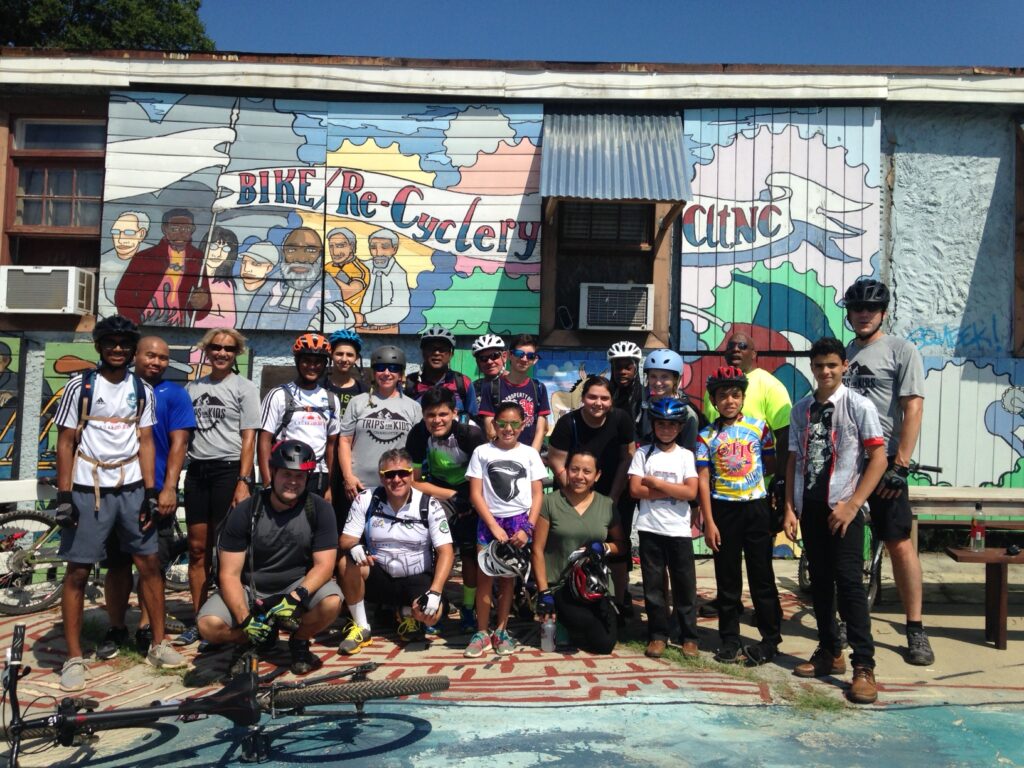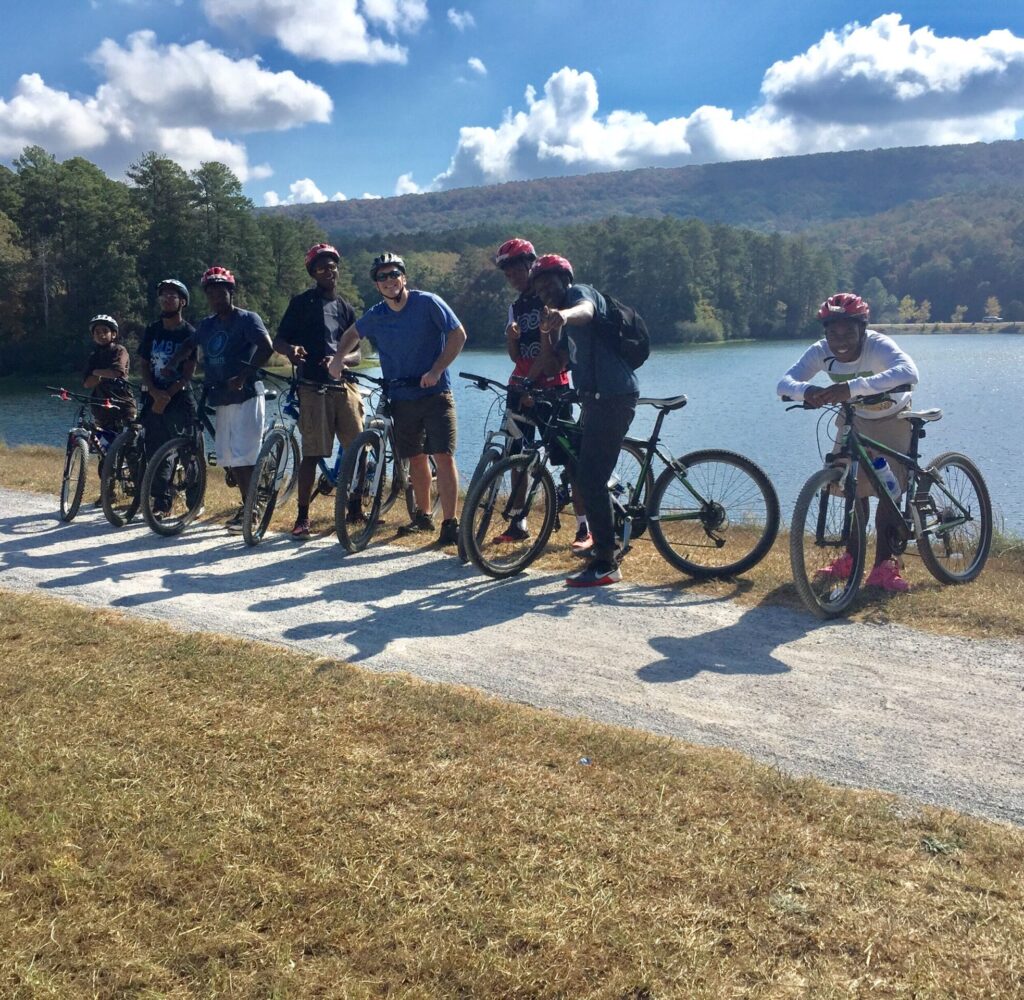DISCOVER YOUR LOCAL BICYCLING COMMUNITY
Find local advocacy groups, bike shops, instructors, clubs, classes and more!
Trips for Kids goes beyond Trips and Kids: A legacy continued by the League
The following story was written by Alyssa Proudfoot Siegel, our former Engagement & Programming Coordinator, and was originally featured in the Winter 2023 issue of American Bicyclist.

The year is 1982 in Marin County, California. Stevie Wonder, Donna Summer, and Fleetwood Mac are dominating the radio waves. ET and Indiana Jones are blowing up at the box office. The leading philosophy on shoulder pads is that bigger always equals better. And widespread access to mountain biking is about to change cycling forever.
At this point, the Larkspur Canyon Gang had been shredding down Mount Tamalpais on klunkers for over 20 years, but the first mass-produced mountain bike, the inaugural Specialized Stumpjumper, was less than a year old. Marilyn Price, working at the Cove Bike Shop in Tiburon, fell in love. Mountain biking was a rush and connected her to nature.
Overlooking San Francisco after another successful summit of Mt. Tam with her trusty Trailmaster, she thought back to all the kids she connected with while volunteering at St. Anthony’s Dining Room back in the city. She knew that if any one of them was able to experience what she was feeling in this very moment, that it would change their lives forever.
And thus, Trips for Kids was born. It started simply– with a single ride in Pt. Reyes National Seashore, a handful of rented mountain bikes, and some very excited kids from the city, most of whom had never been across the Golden Gate Bridge, let alone in the beautiful expanse that laid before them.
“Cycling really is my therapy,” former Trips for Kids (TFK) CEO, Patricia Gallery, said in her announcement of the League’s acquisition of TFK at the 2023 North Carolina BikeWalk Summit. “I knew that through this kind of therapy, we could truly change the lives of these kids for the better.”
These humble beginnings didn’t stay humble for long. Quickly, Price realized the need existed beyond the Bay Area–people from all over the country and beyond were reaching out, asking for assistance beginning their own Trips for Kids chapters.
Price founded a national non-profit, and Trips for Kids grew bigger than just rides. Local chapters opened re-cycleries, set up earn-a-bike programs, and many became community hubs for cyclists of all types, youth and adults alike.

One of the best examples of this is The Charlotte Re-Cyclery, a chapter of Trips for Kids. Since 2000, The Re-Cyclery has been a cornerstone of the Charlotte community. From the beginning, founder Paula Fricke would lead Charlotte youth on local trails every Saturday morning, and she did this religiously for almost 20 years. Fricke also reached out to community members to help establish a re-cyclery program: a circular economy-based community bike shop program which directly funds all of their community and youth bike programs.
This funding also supports their Earn-a-Bike Program, where youth can participate in a six-hour course that teaches about the safety and operation of their bike, then receive that bike for free. Recently, they have been able to expand and offer this program into multiple languages, and start an adult Earn-a-Bike program as well.
Their newest program is Gears for Queers, an affinity group for Charlotte LGBTQIA+ cyclists looking for resources and community. Tabia Lewis, who heads the group and uses he/she pronouns, was inspired by the people she connected with at the Outdoors for All Summit.
“One thing I noticed about Charlotte in particular is yes, historically, Charlotte is a really weird space, because there’s a ton of queer people, especially queer people of color that live there.” Lewis noticed. “I don’t feel like [the city] does a really great job of being a space to foster community in general.”
So Lewis took matters into his own hands. Just two weeks after Outdoors for All, he hosted an affinity night at The Re-Cyclery, followed by workshop nights and volunteer sessions focused on the queer community.
In the future, Lewis wants to “be a satellite for other places and other connections… it’s not just us. There’s more than just us.”
Eric Supil, TFK Charlotte’s Executive Director, knows this rings true across all their programming. “When you think about transformative cycling experiences, you gotta start from meeting folks where they are, right? And so that typically means meeting them literally in their closest park, [or] meeting them in their community center.”
When dreaming about the future, Lewis emphasized the sustainability and longevity of Trips for Kids and its programming: “My hope is that I feel secure in the fact that any program has a legacy after I am no longer around, and that volunteers will feel empowered enough to say, ‘I wanna do something, I wanna take initiative. I understand that you host this thing, but please pass me the mic, ’cause I have some ideas.’”

In 2023, the League inherited the expansive history of Trips for Kids National. League staff got a chance to meet with TFK chapter leads, including Supil, and talk about the bright future of the program. “I’m excited about what it could be like, using the League as a network…getting the word out and making ourselves accessible, not just on a local level, but on a national level. I’m really interested in seeing this or things like this pop up all over the place, because they’re huge, huge assets to the community.”
Doug Brown, the Executive Director of Trips for Kids Birmingham, said it best: “Really and truly– yeah, we give to kids–but what they give us is pretty amazing too.”